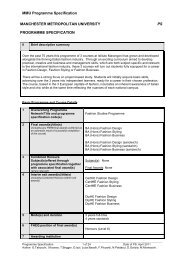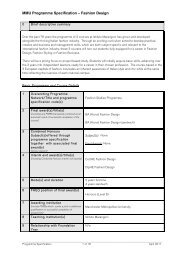manchester metropolitan university ps1 ... - Istituto Marangoni
manchester metropolitan university ps1 ... - Istituto Marangoni
manchester metropolitan university ps1 ... - Istituto Marangoni
Create successful ePaper yourself
Turn your PDF publications into a flip-book with our unique Google optimized e-Paper software.
(i)<br />
Curriculum Design<br />
The University’s Master’s and Postgraduate Diploma awards are designed to ensure that students<br />
meet the University’s General Educational Aims.<br />
The curriculum for these programmes is designed to support students in achieving the intended<br />
outcomes in a strong industrial context.<br />
These two awards share no common units, as the subject areas are substantially different.<br />
The Manchester Metropolitan University’s general Educational Aims are addressed throughout the<br />
programmes: for example, in the Fashion and luxury Brand Management and Fashion Design<br />
Womenswear Master’s courses, industry partners will visit and brief students about their current<br />
market position and discuss needs to develop into other sectors. Fashion Design Womenswear<br />
students will produce collection proposals that are relevant to their new position in the market through<br />
design and branding.<br />
These approaches are explained further in the individual unit outlines.<br />
Students will be required to write a PDP journal and reflect on how they worked within a team and the<br />
different perspectives brought to the collaboration by the various participants.<br />
Learning and Teaching Methods:<br />
This Network of courses is mainly based around formal lectures, workshops, seminars and selfdirected<br />
study and within this structure a range of approaches to learning and teaching is employed as<br />
appropriate to the situation. Industry experienced specialists and visiting specialist Lecturers (industry<br />
professionals) make valuable contributions and facilitate important links to professional practice.<br />
Self-Directed Study – plays a major role in this programme, where students are expected to spend<br />
time researching and analysing subject matter independently to support and substantiate taught<br />
material.<br />
Formal Lectures – form an integral part of the programme and with formal delivery of key information<br />
to the whole cohort. At this level it is expected that students will use the lectures as a stimulus for<br />
further study/reading.<br />
Seminars – are used to build on themes taken from the lecture programme. Students are encouraged<br />
to make an active contribution by sharing in the argument and debate. They are expected to prepare<br />
for the seminars through directed reading given prior to the sessions.<br />
Visiting Lecturers – are invited to deliver specialist lectures to enhance the delivery of the units.<br />
Individual Tutorials – are used when individual student work is being discussed or the guidance<br />
required is specific to one particular student. It is especially important in the dissertation phase and<br />
may be face to face, over the telephone, via e-mail or Skype.<br />
Small Group Tutorials – enable students to discuss and plan their work in greater detail than is<br />
possible with larger groups. It encourages quieter students to develop their interpersonal and<br />
communication skills and helps consolidate leadership skills in others.<br />
Video Presentations - are used to give a more in-depth understanding of a specific issue.<br />
Case Studies – are used for detailed discussion of real-life situations.<br />
Demonstrations – are normally of a technical nature and are necessary in certain subject areas.<br />
Studio / Workshop / Laboratory / Practical Sessions – may be used to enable the creative and<br />
practical skill development of the student in an environment which simulates that of industry.<br />
Group and Team Work – requires students to operate as a member of a group or team and they<br />
usually have clearly identified roles. The emphasis is on collective responsibility, individual<br />
responsibility to the group and joint decision-making.<br />
Programme Specification: Date: November 2011<br />
Author: A.P.Roberts<br />
Page 8 of 20








